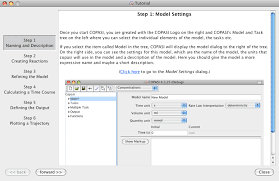Uncover the powerful yet underrated software tools transforming biochemical engineering, from modeling to data analysis and beyond.
In biochemical engineering, certain software tools receive widespread attention and are frequently used in academic and industrial settings. However, numerous underrated tools offer unique and powerful capabilities, which can significantly enhance various aspects of biochemical engineering.
Let's delve into these hidden treasures and explore their applications and benefits.
Open Sim
| Windows, macOS, Linux |
Cell Designer
| Windows, macOS, Linux |
CHEBI
| Windows, macOS, Linux |
Tinker
| Windows, macOS, Linux |
COPASI
| Windows, macOS, Linux |
Open Sim:
An open-source, user-expandable software system for modeling and simulating biological and physiological movements that let users develop models of musculoskeletal structures and create dynamic simulation methodologies. Particularly, it is useful for biomechanics and movement science studies.
- Open Sim currently released a new version name called "OpenSim-4.5" The new software includes improvements to the look and feel of the GUI, published CONDA and Docker packages, additional MOCO functionality, and the introduction of Function Based Path for function-based muscle wrapping.
Cell Designer:
Cell Designer is a structured diagram editor for drawing gene-regulatory and biochemical networks. An intuitive user interface helps you draw a diagram in rich graphical representation with your own design.
Cell Designer allows user-friendly visualization, modeling, and simulation of genetic regulatory, protein, and metabolic networks.
Cell Designer is SBML-compliant software. SBML [System Biology Mark-Up Language] is a machine-readable format for expressing models. It focuses on characterizing systems in which biological components are involved and influenced by processes that occur throughout time. A biological reaction network is one such example.
 |
| Image/Cell Designer.org |
To download and learn the ultimate startup guide for Cell-Designer
*The Current Version of Cell Designer is "Cell Designer 4.42"
Key Features:- Garuda enables:
- New [Garuda] menu for connecting to the Garuda platform (http://gateway.garuda-alliance.org)
- New plugin API: Managing the response label and link points macOS Mojave support
- Ubuntu 18.04 Support
Installation: For details on the installation procedure, check here
CHEBI: [Chemical Entities of Biological Interest]
Chemical Entities of Biological Interest (CHEBI) is a comprehensive database and ontology focusing on small chemical compounds. It is an integral part of the Open Biomedical Ontologies initiative and serves as a valuable resource for researchers and scientists working in the field of molecular biology.
CHEBI provides detailed information about diverse chemical entities, including their structures, names, and biological activities. This resource plays a crucial role in understanding and exploring biological systems' chemical composition.\
 |
| Image: CHEBI database |
Installation: For details on the installation procedure, check here
Tinker
Molecular dynamics simulated software codes provide a complete set of general molecular dynamics and molecular mechanics tools with some special biomolecular features. A modular set of callable routines that allow manipulating coordinates and evaluating potential energy and derivatives via straightforward means are the core of this software.
 |
Image: Tinker (Open-Source homepage)
|
Tinker works on Windows, MacOS, Linux, and Unix. The source code is available to non-commercial users under a proprietary license.
*Energy minimizing, Control of molecular stochastic normal mode vibration analysis, simulated annealing, etc. These are the provided functions in the program.
Tinker - Software Tools for Molecular Design
COPASI [Complex pathway simulator]
An Open-Source software application for creating and solving mathematical models of biological processes such as metabolic networks, cell signaling pathways, regulatory networks, and Infectious disease in many ways.
 |
| Image: COPASI SOFTWARE |
Complex pathway simulator software includes features to define models of biological processes, simulate and analyze these models, generate analysis reports, and import/export models in SBML format.
* Model Definition
* Tasks
* Importing and Exporting
1. Model Definition
The Chemical reaction between molecular species is defined as molecular definition. the rate law is defined by the dynamics of the model associated with individual reactions.
2. Tasks
Tasks are different types of analysis that can be performed on a model. They include steady state of analysis, stoichiometric analysis, time course simulation algorithm, metabolic control analysis computational of Lyapunov exponent time scale separation, parameter scans, optimization, and parameter estimation.
3. Importing and Exporting
COPASI can read models in SBML format as well as in GEPASI format. COPASI can write models in several different formats including the SBML source code in the C programming language.
COPASI supports Windows, MacOS, and Linux
COPASI - Mac OS + Big sur (intel)
4.43.288 = Mac OS











Comments
Post a Comment